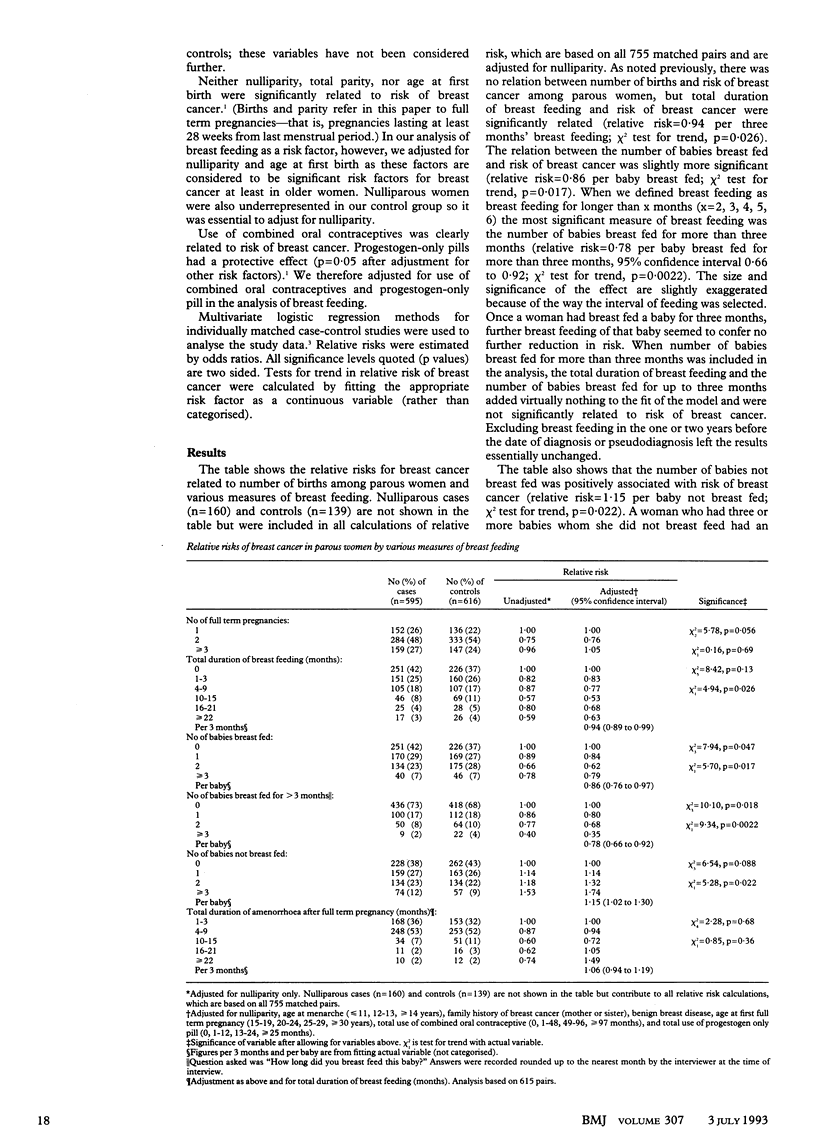Abstract
OBJECTIVE--To investigate whether breast feeding is related to subsequent risk of breast cancer. DESIGN--Population based case-control study designed primarily to investigate the relation between oral contraceptives and risk of breast cancer; data obtained from questionnaires administered by interviewers, general practitioner notes, and family planning clinic records. SETTING--11 health regions in Britain. SUBJECTS--Women diagnosed with breast cancer before age 36 living in the defined study areas. One control per case, matched for age, was selected from the list of the case's general practitioner. 755 case-control pairs were interviewed. MAIN OUTCOME MEASURES--Duration of breast feeding each liveborn infant; timing of return of menses; hormone use; other risk factors for breast cancer. RESULTS--Risk of breast cancer fell with increasing duration of breast feeding (relative risk = 0.94 per three months' breast feeding; test for trend p = 0.026) and with number of babies breast fed (relative risk = 0.86; test for trend, p = 0.017). Breast feeding each baby for longer than three months conferred no additional benefit. Breast feeding was more strongly negatively associated with risk of breast cancer than duration of postpartum amenorrhoea (chi 2 test for trend, p = 0.69). Hormonal suppression of lactation was unrelated to risk of breast cancer (relative risk = 0.96 per episode of suppressed lactation; test for trend, p = 0.72). CONCLUSIONS--These results suggest that breast feeding protects against the development of breast cancer in young women.
Full text
PDF



Selected References
These references are in PubMed. This may not be the complete list of references from this article.
- Adami H. O., Bergström R., Lund E., Meirik O. Absence of association between reproductive variables and the risk of breast cancer in young women in Sweden and Norway. Br J Cancer. 1990 Jul;62(1):122–126. doi: 10.1038/bjc.1990.242. [DOI] [PMC free article] [PubMed] [Google Scholar]
- Byers T., Graham S., Rzepka T., Marshall J. Lactation and breast cancer. Evidence for a negative association in premenopausal women. Am J Epidemiol. 1985 May;121(5):664–674. doi: 10.1093/aje/121.5.664. [DOI] [PubMed] [Google Scholar]
- Gray R. H., Campbell O. M., Apelo R., Eslami S. S., Zacur H., Ramos R. M., Gehret J. C., Labbok M. H. Risk of ovulation during lactation. Lancet. 1990 Jan 6;335(8680):25–29. doi: 10.1016/0140-6736(90)90147-w. [DOI] [PubMed] [Google Scholar]
- Kvåle G., Heuch I. Lactation and cancer risk: is there a relation specific to breast cancer? J Epidemiol Community Health. 1988 Mar;42(1):30–37. doi: 10.1136/jech.42.1.30. [DOI] [PMC free article] [PubMed] [Google Scholar]
- Layde P. M., Webster L. A., Baughman A. L., Wingo P. A., Rubin G. L., Ory H. W. The independent associations of parity, age at first full term pregnancy, and duration of breastfeeding with the risk of breast cancer. Cancer and Steroid Hormone Study Group. J Clin Epidemiol. 1989;42(10):963–973. doi: 10.1016/0895-4356(89)90161-3. [DOI] [PubMed] [Google Scholar]
- London S. J., Colditz G. A., Stampfer M. J., Willett W. C., Rosner B. A., Corsano K., Speizer F. E. Lactation and risk of breast cancer in a cohort of US women. Am J Epidemiol. 1990 Jul;132(1):17–26. doi: 10.1093/oxfordjournals.aje.a115629. [DOI] [PubMed] [Google Scholar]
- McTiernan A., Thomas D. B. Evidence for a protective effect of lactation on risk of breast cancer in young women. Results from a case-control study. Am J Epidemiol. 1986 Sep;124(3):353–358. doi: 10.1093/oxfordjournals.aje.a114405. [DOI] [PubMed] [Google Scholar]
- Siskind V., Schofield F., Rice D., Bain C. Breast cancer and breastfeeding: results from an Australian case-control study. Am J Epidemiol. 1989 Aug;130(2):229–236. doi: 10.1093/oxfordjournals.aje.a115329. [DOI] [PubMed] [Google Scholar]


